CORPORATE ACTION: Coca-Cola
Coca-Cola Says It Replaced Colored PET Bottles With Clear Bottles To Improve Sustainability
Coca-Cola HBC Austria Adopts Fiber-Based Packaging For Lemonade Multipacks
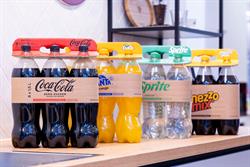 Coca-Cola HBC Austria has partnered with Krones, DS Smith and Mondi to develop a fiber-based secondary packaging for 1.5-liter PET lemonade multipacks from its Coca-Cola, Fanta, Sprite and Mezzo Mix brands. The company took this step to help reduce plastic use by approximately 200 tonnes each year. Coca-Cola said Krones contributed its LitePac Top technology in helping the beverage company move from plastic film to cardboard and kraft paper solutions.[Image Credit: © Coca-Cola HBC]
Coca-Cola HBC Austria has partnered with Krones, DS Smith and Mondi to develop a fiber-based secondary packaging for 1.5-liter PET lemonade multipacks from its Coca-Cola, Fanta, Sprite and Mezzo Mix brands. The company took this step to help reduce plastic use by approximately 200 tonnes each year. Coca-Cola said Krones contributed its LitePac Top technology in helping the beverage company move from plastic film to cardboard and kraft paper solutions.[Image Credit: © Coca-Cola HBC]
CORPORATE ACTION: Colgate
TINA Finds Colgate Guilty Of Falsely Advertising Toothpaste Tubes As Recyclable
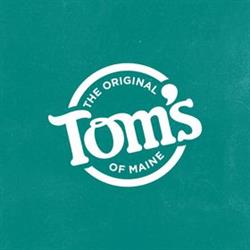
The advertising watchdog, truthinadvertising.org, has concluded that Colgate-Palmolive is in violation of the FTC’s Green Guides for falsely advertising that its Tom’s of Maine and Colgate toothpaste tubes as recyclable. The organization has filed a complaint against the company with the FTC and regulators in California and Connecticut, calling on the agencies to take enforcement action against the consumer products manufacturer. Results of the organization’s investigation revealed that the toothpaste tubes, although technically recyclable, are not being recycled due to contamination, size and shape of the tubes and other issues.[Image Credit: © Tom's of Maine, Inc.]
CORPORATE ACTION: Henkel
Henkel, CCL Win AWA Sustainability Award For Improved PET Bottle Recyclability
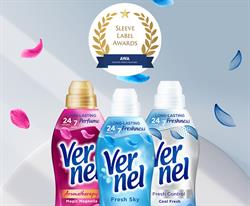
Henkel and CCL have won the 2023 Alexander Watson Associates Sleeve Label Award for Environmental Contribution for the sustainable design of Henkel’s Vernel fabric softener bottle. Henkel is using CCL’s EcoFloat sleeve technology to enhance the recyclability of PET bottle bodies. EcoFloat is designed to facilitate the separation of sleeve and bottle body during the recycling process.[Image Credit: © Henkel AG & Co. KGaA]
CORPORATE ACTION: Johnson & Johnson
SC Johnson Drafts Milwaukee Brewers To Help Celebrate Scrubbing Bottles Made From Recycled Plastic Cups
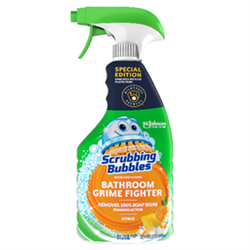
SC Johnson is working with the Milwaukee Brewers baseball team to mark the launch of a special edition Scrubbing Bubbles Citrus Scent Bathroom Cleaner household cleaning product. The product comes in a bottle made from recycled plastic cups collected at the American Family Field in Wisconsin. It will be sold at 12 Meijer retail stores across the state.[Image Credit: © S.C. Johnson & Son Inc.]
CORPORATE ACTION: Nestlé
Nespresso Launches Home-Compostable Capsules In France, Switzerland
 Nespresso has launched its coffee pods that can be composted by consumers at home in France and Switzerland. The company, which sells 14 billion Nespresso-branded coffee capsules a year, was forced to come up with the sustainable coffee pods to address increased competition in the segment and growing scrutiny into the product’s environmental impact. Smaller competitors’ launches of third-party biodegradable capsules also helped convince the company to launch their own line of environment-friendly capsules.[Image Credit: © Nestlé Nespresso SA]
Nespresso has launched its coffee pods that can be composted by consumers at home in France and Switzerland. The company, which sells 14 billion Nespresso-branded coffee capsules a year, was forced to come up with the sustainable coffee pods to address increased competition in the segment and growing scrutiny into the product’s environmental impact. Smaller competitors’ launches of third-party biodegradable capsules also helped convince the company to launch their own line of environment-friendly capsules.[Image Credit: © Nestlé Nespresso SA]
CORPORATE ACTION: Tesco
Tesco Donates Planters Made From Recycled Plastic To UK School Greening Campaign
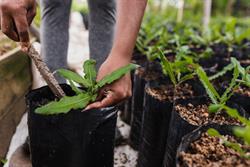 Tesco is supporting the Veolia Orchard campaign to introduce green areas in schools and help children learn more about the environment. As part of the collaboration, Tesco will donate planters made from recycled soft plastic collected in its stores from customers. Currently in its second year, the Veolia Orchard campaign will donate almost 600 fruit trees and 800 strawberry plants to schools without green areas.[Image Credit: © Vitor Monthay on Unsplash]
Tesco is supporting the Veolia Orchard campaign to introduce green areas in schools and help children learn more about the environment. As part of the collaboration, Tesco will donate planters made from recycled soft plastic collected in its stores from customers. Currently in its second year, the Veolia Orchard campaign will donate almost 600 fruit trees and 800 strawberry plants to schools without green areas.[Image Credit: © Vitor Monthay on Unsplash]
CORPORATE ACTION: Unilever
Unilever Joins Forces With BPGMEA To Promote Circular Economy In Bangladesh
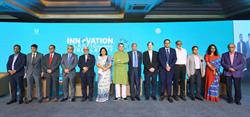 Unilever Bangladesh Limited partnered with the Bangladesh Plastic Goods Manufacturers and Exporters Association to hold a seminar seeking to promote a circular plastics economy. Also, the event included an exhibition highlighting innovations in manufacture and recycling of plastic products and packaging from local groups and Unilever Bangladesh.[Image Credit: © Unilever]
Unilever Bangladesh Limited partnered with the Bangladesh Plastic Goods Manufacturers and Exporters Association to hold a seminar seeking to promote a circular plastics economy. Also, the event included an exhibition highlighting innovations in manufacture and recycling of plastic products and packaging from local groups and Unilever Bangladesh.[Image Credit: © Unilever]
CORPORATE ACTION: Walmart
Walmart’s Compostable Cutlery Works Like Plastic
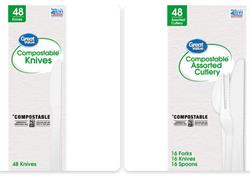 Walmart’s senior vice president of food and consumables, private brand manufacturing, Scott Morris, and SVP of merchandising, household essentials, Jennifer R. Jackson talked about the retailer’s 100% compostable, private-brand cutlery. Jackson said the cutlery, which is part of the company’s Great Value brand, is available in 1,400 stores across the country and includes commercially compostable forks, knives, spoons, and various types of cutlery. Morris said the cutlery is made from “commercially compostable raw materials” while providing consumers with the same convenience and durability of plastic cutlery. [Image Credit: © Walmart Inc.]
Walmart’s senior vice president of food and consumables, private brand manufacturing, Scott Morris, and SVP of merchandising, household essentials, Jennifer R. Jackson talked about the retailer’s 100% compostable, private-brand cutlery. Jackson said the cutlery, which is part of the company’s Great Value brand, is available in 1,400 stores across the country and includes commercially compostable forks, knives, spoons, and various types of cutlery. Morris said the cutlery is made from “commercially compostable raw materials” while providing consumers with the same convenience and durability of plastic cutlery. [Image Credit: © Walmart Inc.]
CORPORATE ACTION: Other
Marks and Spencer Switches To Reusable Paper Bags In All UK Stores
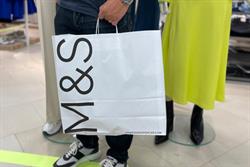 Marks & Spencer has announced it is replacing plastic carrier bags with paper bags in all stores, expanding the initial run that covered 10 of the retailer’s stores in December 2022. According to the retailer, the paper bags are certified by the Forest Stewardship Council and designed to be water-resistant. The paper bags are available in all stores across the UK and are designed to be used more than 100 times.[Image Credit: © Marks & Spencer]
Marks & Spencer has announced it is replacing plastic carrier bags with paper bags in all stores, expanding the initial run that covered 10 of the retailer’s stores in December 2022. According to the retailer, the paper bags are certified by the Forest Stewardship Council and designed to be water-resistant. The paper bags are available in all stores across the UK and are designed to be used more than 100 times.[Image Credit: © Marks & Spencer]
CAMPAIGNS, COMMITMENTS & NGOs
Plastic Recycling Trial Involves More Than 4,000 Households In England’s Reading Borough
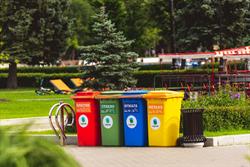 Regular kerbside recycling collections will be expanded in Reading Borough in England to include various types of plastic waste, including plastic bags, crisp packets, plastic film and bubble wrap. The trial, which is part of the £2.9 million Flexible Plastic Fund “FlexCollect” project, will start on September 18, 2023, covering more than 4,000 households in the borough. Residents participating in the trial will need to place items to be recycled in specially provided blue bags and deposit them in existing recycling bins after tying them securely.[Image Credit: © Vlad Vasnetsov from Pexels]
Regular kerbside recycling collections will be expanded in Reading Borough in England to include various types of plastic waste, including plastic bags, crisp packets, plastic film and bubble wrap. The trial, which is part of the £2.9 million Flexible Plastic Fund “FlexCollect” project, will start on September 18, 2023, covering more than 4,000 households in the borough. Residents participating in the trial will need to place items to be recycled in specially provided blue bags and deposit them in existing recycling bins after tying them securely.[Image Credit: © Vlad Vasnetsov from Pexels]
Europe Breaks Free From Plastics, US Remains Addicted
 Europe has been getting rid of plastic packaging in food industry and other industries, while the United States continues its dependence on single-use plastic. Europe has demonstrated that political will and popular support can go a long way in promoting the use of alternative packaging, such as paper, and pushing recycling and sustainability. EU’s sustainable packaging directive included criteria for environment-friendly packaging designs and extended producer responsibility.[Image Credit: © Jon Tyson on Unsplash]
Europe has been getting rid of plastic packaging in food industry and other industries, while the United States continues its dependence on single-use plastic. Europe has demonstrated that political will and popular support can go a long way in promoting the use of alternative packaging, such as paper, and pushing recycling and sustainability. EU’s sustainable packaging directive included criteria for environment-friendly packaging designs and extended producer responsibility.[Image Credit: © Jon Tyson on Unsplash]
ALLIANCES, PARTNERSHIPS & JVs
International Group Releases Draft Proposed Global Plastics Treaty
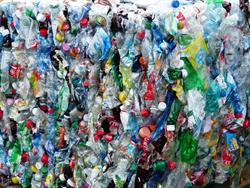 The Intergovernmental Negotiating Committee on Plastic Pollution has released a “zero draft” edition of the proposed global plastics treaty. The text includes all the proposed provisions that will be discussed during the third phase of negotiations aimed at finalizing the UN Treaty to End Global Plastic Pollution to be held in Nairobi, Kenya, from November 13, 2023. Environmentalist groups have expressed support for the draft’s language calling for cuts in plastics production and elimination of polymers and chemicals.[Image Credit: © Hans from Pixabay]
The Intergovernmental Negotiating Committee on Plastic Pollution has released a “zero draft” edition of the proposed global plastics treaty. The text includes all the proposed provisions that will be discussed during the third phase of negotiations aimed at finalizing the UN Treaty to End Global Plastic Pollution to be held in Nairobi, Kenya, from November 13, 2023. Environmentalist groups have expressed support for the draft’s language calling for cuts in plastics production and elimination of polymers and chemicals.[Image Credit: © Hans from Pixabay]
CONSUMER & PUBLIC OPINION
UK Voters Prefer Political Parties That Promote Recycling And Reuse
 In the UK, 38 percent of voters said they want to see an expanded range of materials collected for recycling, according to climate action non-government organization WRAP. Results of the NGO’s survey of more than 1,000 adults revealed that voters are more likely to vote for a political party with a manifesto that includes policies promoting recycling and reuse. Also, survey results showed that 44 percent of voters who make decisions based on how the economy and key government services are doing prefer to see recycling policies.[Image Credit: © WRAP]
In the UK, 38 percent of voters said they want to see an expanded range of materials collected for recycling, according to climate action non-government organization WRAP. Results of the NGO’s survey of more than 1,000 adults revealed that voters are more likely to vote for a political party with a manifesto that includes policies promoting recycling and reuse. Also, survey results showed that 44 percent of voters who make decisions based on how the economy and key government services are doing prefer to see recycling policies.[Image Credit: © WRAP]
EMERGING IDEAS, THEMES & TRENDS
Reuse Model Holds Key To Stopping Plastic Waste Pollution
 Adoption of the plastic waste reuse model is gaining momentum, driven by innovations and commitments from the world’s leading consumer goods companies. According to the UN Environment Program’s report, “Turning Off the Tap,” reuse is an essential part of any campaign to end plastic pollution, while the World Economic Forum and Kearney said “reusing 10% of plastic products” can eliminate half of annual plastic ocean waste. Stakeholders need to collaborate to ensure the widest possible adoption of reuse.[Image Credit: © micheile henderson on Unsplash]
Adoption of the plastic waste reuse model is gaining momentum, driven by innovations and commitments from the world’s leading consumer goods companies. According to the UN Environment Program’s report, “Turning Off the Tap,” reuse is an essential part of any campaign to end plastic pollution, while the World Economic Forum and Kearney said “reusing 10% of plastic products” can eliminate half of annual plastic ocean waste. Stakeholders need to collaborate to ensure the widest possible adoption of reuse.[Image Credit: © micheile henderson on Unsplash]
RESEARCH
Singapore Scientists Create Process For Upcycling Plastic Waste
 Nanyang Technological University scientists in Singapore have developed a process that can transform most plastic waste into chemicals of greater value and with applications for energy storage. The process uses light-emitting diodes and a commercially available catalyst and can be performed at room temperature. Also, the scientists said the process is highly energy-efficient and can be easily powered by renewable energy.[Image Credit: © Nanyang Technological University]
Nanyang Technological University scientists in Singapore have developed a process that can transform most plastic waste into chemicals of greater value and with applications for energy storage. The process uses light-emitting diodes and a commercially available catalyst and can be performed at room temperature. Also, the scientists said the process is highly energy-efficient and can be easily powered by renewable energy.[Image Credit: © Nanyang Technological University]
Michigan State University Uses Table Salt As Catalyst For Mixed Plastic Recycling
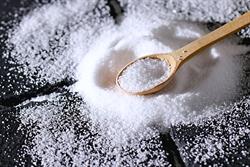 Michigan State University researchers have shown that ordinary table salt (NaCl) can enable the low temperature pyrolysis of polyolefins and pyrolyzing of metallized plastics with high efficiency rates of conversion. The polyolefins used in the study included high-density polyethylene, low-density polyethylene, linear low-density polyethylene and polypropylene with a 4:2:2:3 ratio. The researchers also looked at the re-use of salt, the effect of salt particle size and effect of weight percentage. Results of the study suggest that table salt can help bring about an inexpensive and efficient pyrolysis method for recycling mixed plastic wastes into beneficial hydrocarbon products.[Image Credit: © Marek from Pixabay]
Michigan State University researchers have shown that ordinary table salt (NaCl) can enable the low temperature pyrolysis of polyolefins and pyrolyzing of metallized plastics with high efficiency rates of conversion. The polyolefins used in the study included high-density polyethylene, low-density polyethylene, linear low-density polyethylene and polypropylene with a 4:2:2:3 ratio. The researchers also looked at the re-use of salt, the effect of salt particle size and effect of weight percentage. Results of the study suggest that table salt can help bring about an inexpensive and efficient pyrolysis method for recycling mixed plastic wastes into beneficial hydrocarbon products.[Image Credit: © Marek from Pixabay]
OTHER NEWS
Paptic Completes Another Round Of Financing To Boost Future Expansion
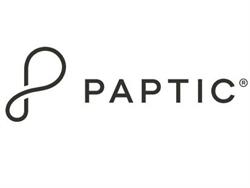 Paptic Ltd., a Finnish company that developed Paptic® fiber-based and recyclable materials to replace plastics and other conventional packaging materials, has raised €23 million in funding to finance its growth and expansion plans, including product development, manufacturing partnerships and the availability of Paptic materials worldwide. It has added new investors including German venture capital fund European Circular Bioeconomy Fund and international water and hygiene solutions provider Ecolab. Japanese trade house Itochu Fibre Ltd. and some of Paptic’s earlier shareholders also joined the financing round.[Image Credit: © Paptic Ltd]
Paptic Ltd., a Finnish company that developed Paptic® fiber-based and recyclable materials to replace plastics and other conventional packaging materials, has raised €23 million in funding to finance its growth and expansion plans, including product development, manufacturing partnerships and the availability of Paptic materials worldwide. It has added new investors including German venture capital fund European Circular Bioeconomy Fund and international water and hygiene solutions provider Ecolab. Japanese trade house Itochu Fibre Ltd. and some of Paptic’s earlier shareholders also joined the financing round.[Image Credit: © Paptic Ltd]
Copyright 2026 Business360, Inc.

